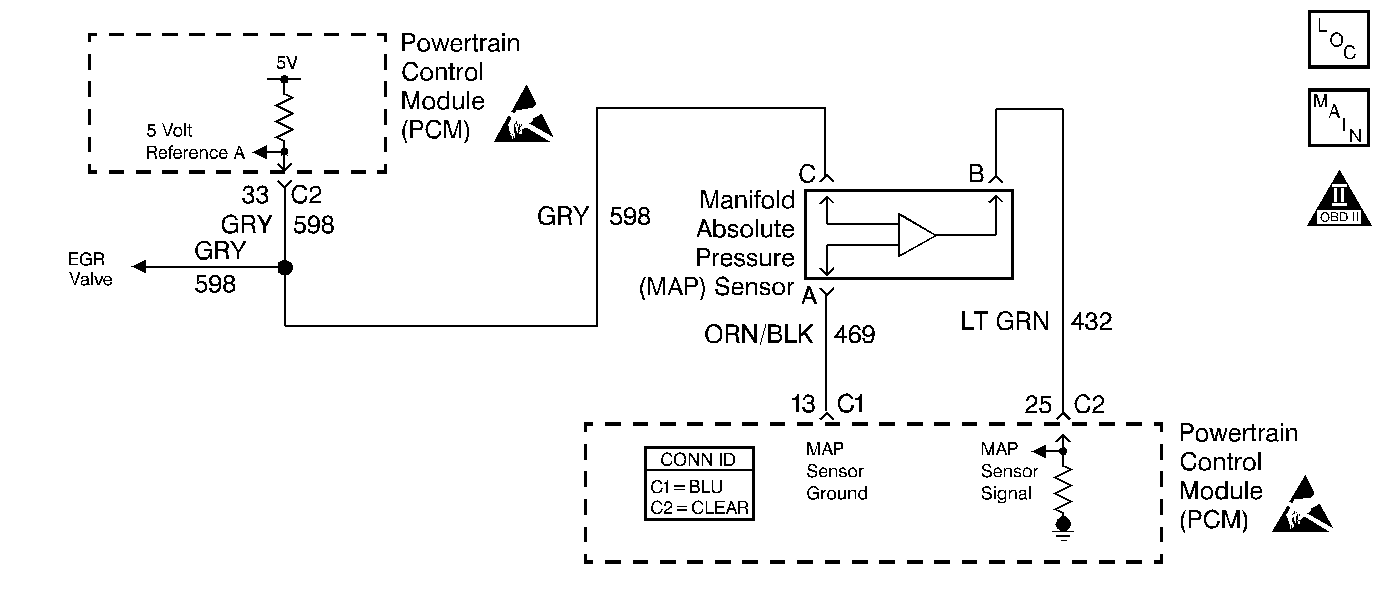
Circuit Description
The manifold absolute pressure (MAP) sensor responds to changes in intake manifold pressure (vacuum). The MAP sensor signal voltage to the PCM varies from less than 2 volts at idle (high vacuum) to more than 4 volts with the key ON, engine not running or at wide-open throttle (low vacuum). The MAP sensor determines the manifold pressure changes while the running the EGR flow test diagnostic, and updates the barometric pressure reading (BARO). The PCM monitors the MAP signals for voltages outside the normal range of the MAP sensor. If the PCM detects a MAP signal voltage that is intermittently high, DTC P1106 will set.
Conditions for Running the DTC
| • | No TP sensor DTCs are present. |
| • | The engine has been running for a length of time that is determined by startup coolant temperature. The length of time ranges from 2 minutes at less than -30°C (-22°F) to 0.5 second at more than 30°C (86°F). |
| • | The throttle position is less than 2 percent when the engine speed is less than 900 rpm. |
| OR |
| The throttle position is 0 percent when the engine speed is more than 900 rpm. |
Conditions for Setting the DTC
| • | The MAP sensor intermittently indicates a voltage more than 4.2 volts. |
| • | The above conditions are present for more than 5 seconds. |
Action Taken When the DTC Sets
The PCM stores conditions which were present when the DTC set as Failure Records only. This information will not be stored as Freeze Frame Records.
Conditions for Clearing the MIL/DTC
| • | The DTC becomes history when the conditions for setting the DTC are no longer present. |
| • | The history DTC clears after 40 malfunction free warm-up cycles. |
| • | The PCM receives a clear code command from the scan tool. |
Diagnostic Aids
Inspect for the following:
Many situations may lead to an intermittent condition. Perform each inspection or test as directed.
Important: : Remove any debris from the connector surfaces before servicing a component. Inspect the connector gaskets when diagnosing or replacing a component. Ensure that the gaskets are installed correctly. The gaskets prevent contaminate intrusion.
| • | Loose terminal connection |
| - | Use a corresponding mating terminal to test for proper tension. Refer to Testing for Intermittent Conditions and Poor Connections , and to Connector Repairs in Wiring Systems for diagnosis and repair. |
| - | Inspect the harness connectors for backed out terminals, improper mating, broken locks, improperly formed or damaged terminals, and faulty terminal to wire connection. Refer to Testing for Intermittent Conditions and Poor Connections , and to Connector Repairs in Wiring Systems for diagnosis and repair. |
| • | Damaged harness--Inspect the wiring harness for damage. If the harness inspection does not reveal a problem, observe the display on the scan tool while moving connectors and wiring harnesses related to the sensor. A change in the scan tool display may indicate the location of the fault. Refer to Wiring Repairs in Wiring Systems for diagnosis and repair. |
| • | Inspect the powertrain control module (PCM) and the engine grounds for clean and secure connections. Refer to Wiring Repairs in Wiring Systems for diagnosis and repair. |
If the condition is determined to be intermittent, reviewing the Snapshot or Freeze Frame/Failure Records may be useful in determining when the DTC or condition was identified.
Step | Action | Values | Yes | No |
|---|---|---|---|---|
1 | Did you perform the Powertrain On-Board Diagnostic (OBD) System Check? | -- | ||
2 | Is DTC P0108 also set? | -- | Go to DTC P0108 Manifold Absolute Pressure (MAP) Sensor Circuit High Voltage | |
3 | Is DTC P1111 or P1115 also set? | -- | ||
4 | Inspect the MAP ground for a poor connection at the MAP sensor. Refer to Testing for Intermittent Conditions and Poor Connections and Connector Repairs in Wiring Systems. Did you find and correct the condition? | -- | ||
5 | Inspect the MAP ground for a poor connection at the PCM. Refer to Testing for Intermittent Conditions and Poor Connections and Connector Repairs in Wiring Systems. Did you find and correct the condition? | -- | ||
6 | Test the signal circuit of the MAP sensor for an intermittent short to voltage. Refer to Circuit Testing and Wiring Repairs in Wiring Systems. Did you find and correct the condition? | -- | ||
7 | Test the 5 volt reference A circuit of the MAP for an intermittent short to voltage. Refer to Circuit Testing and Wiring Repairs in Wiring Systems. Did you find and correct the condition? | -- | ||
8 | Test the ground circuit for an intermittent open. Refer to Circuit Testing and Wiring Repairs in Wiring Systems. Did you find and correct the condition? | -- | Go to Diagnostic Aids | |
9 |
Does the DTC reset? | -- | System OK |
